The Cure for Fear
God created everything: black cats, the air and space and ground underneath a ladder, four-leaf clovers, the trees from which we get wood — and He made our knuckles, too. I grew up with superstitions. “If a black cat crosses your path, you will have bad luck.” “Don’t walk under a ladder or you will have bad luck.” “A four-leaf clover is good luck.” And I have seen many people knock on wood, haven’t you?
Merriam Webster defines superstition as “a belief or practice resulting from ignorance, fear of the unknown, trust in magic or chance, or a false conception of causation.” God has provided antidotes to ignorance, fear, chance, and false conceptions.
Grace and peace be multiplied to you
in the knowledge of God and of Jesus our Lord;
seeing that His divine power has granted to us
everything pertaining to life and godliness,
through the true knowledge of Him who called us
by His own glory and excellence.
2 Peter 1:2-3
Our holy and loving Heavenly Father made everything and is in charge of everything. To illustrate God’s loving care of us and to teach us not to worry, Jesus talked about God taking care of birds and lilies (Matthew 6:25-34). To teach us not to be afraid, He said that the hairs of our heads are numbered and that God even knows when a sparrow falls to the ground (Matthew 10:29-30). Jesus taught us not to be afraid of tomorrow. What is fear of bad luck if it is not a fear of tomorrow? And what is a desire for good luck if it is not a trust in blessings from some unknown source rather than from the God Who made the universe?
At the opening of scene 10 in He is Near, neighbors gather on the street. As usual, their topic is that strange Mimosa who believes in a different God. Their topic today is the fact that Mimosa is working in a cotton field to support her husband and little boys. As they discuss the difficulties of that kind of work, one of the neighbors says, “Did we not say things would be unlucky for her?”
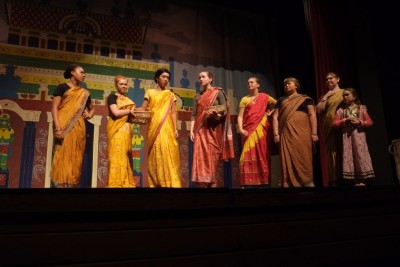
As the women gossip about Mimosa, one of the children wanders over to a plant nearby and touches it. All the women shriek. One asks the child’s mother, “Does your child not know the tulasi plant when she sees it?”
She replies, “Of course she does!” and then chastises her daughter: “How dare you even think of touching that! Don’t you know that you will enrage the gods if you touch the tulasi?”
When her daughter responds that it looks so pretty and smells so nice, her mother shushes her, looks around anxiously, and asks, “Do you want to anger the gods?”
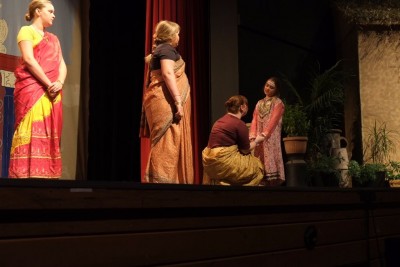
One neighbor asks, “Do you want to bring a curse on yourself?” and one says, “Every child in India should know not to touch the tulasi plant!”
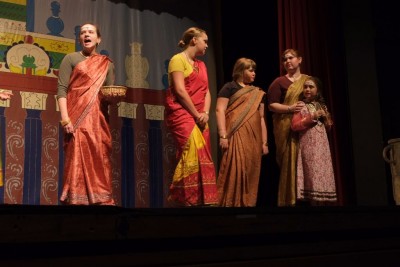
At that moment, Mimosa comes down the street, carrying a bundle of tulasi. The neighbors shriek. One asks if she has gone mad. Another asks what she can be thinking. Several tell her that she will anger the gods and their vengeance will be upon her.
Mimosa tells the women that she is going to use the tulasi for firewood and she tells the women that their gods are not like her God. She says, “There is one great God, and one only.” When the women ask her what she knows of her God, she says, “Very little. I heard of Him only once when I was a very young child. I wanted to stay and hear more, but my father said I must go. I felt my God’s presence then, and I feel it now. I know He is real. He whom I worship is the Creator of the tulasi.”
Neighbors tell her that disaster will follow and that a curse will fall.
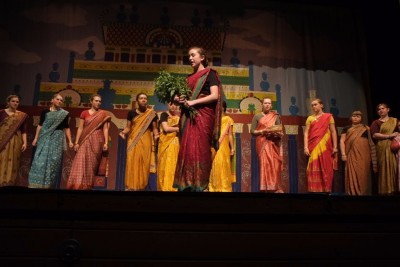
In the next scene, one of the neighbor women comes to Mimosa’s house in a rickshaw to find out what happened when she burned the tulasi.
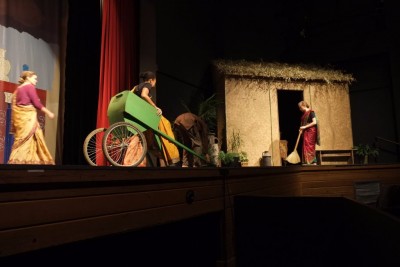
Two other women follow her on foot. Mimosa assures the women that nothing happened except that the fire cooked her food. Then the women begin to ask about her family, confident that something bad will happen to Mimosa or her family.
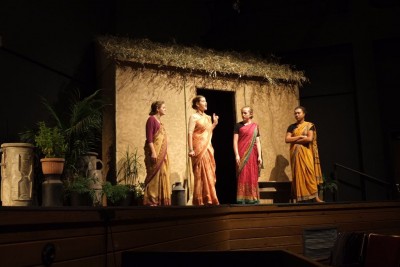
While the women talk, Mimosa’s husband comes running down the street in great pain. Mimosa runs to him there.
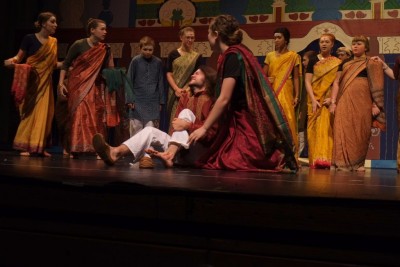
The townspeople begin to shout and offer advice. At first Mimosa’s husband believes he has been stuck by a thorn, but soon everyone decides that a snake has bitten him.

One townsperson after another shouts advice about what to do. “Make a poultice!” “Draw the poison out!” One shouts, “He is certainly going to die!”
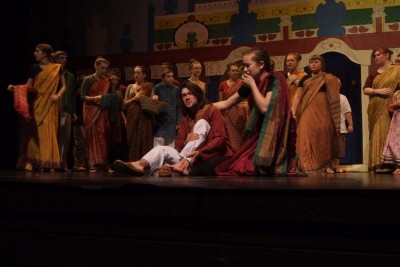
Then, one of the neighbor women starts the accusations: “It is she! It is she!”
“It is all your doing, Mimosa!”
“Did we not say the gods would avenge themselves on you?”
“You have swallowed your husband’s life!”
“Did you not burn the tulasi!”

Suddenly Deva shouts that he can’t see, that he is going blind. Then he begins to shudder and jerk, like he is out of his mind! When one neighbor shouts, “It is the vengeance of the gods,” they all run away in terror.
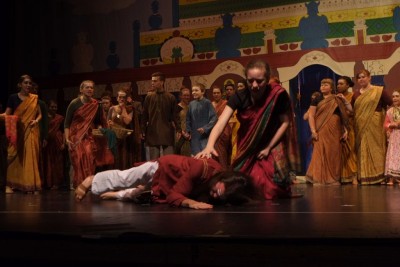
Alone Mimosa helps her very sick husband to their house.
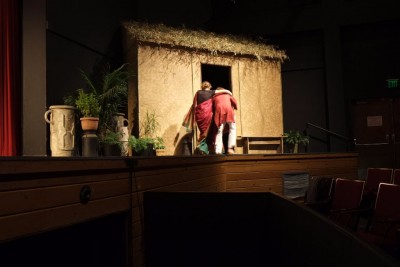
But Mimosa knows she is not alone, even when the most horrible things imaginable happen. She knows Who to trust and she trusts Him. She looks out the door of their home and says to her Father: “I know that You have not forsaken me. I am an emptiness for You to fill.”
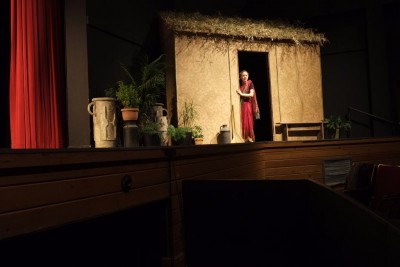
When Mary Evelyn did research for He Is Near, one of her contacts was Mimosa’s great-grandson. Mimosa never let go of her faith — no matter what. She never quit believing that He is near. That faith lives still in the fourth generation. And I have more of her story to tell. Hang on and stay tuned.
The steadfast of mind You will keep in perfect peace,
Because he trusts in You.
Trust in the Lord forever,
For in God the Lord, we have an everlasting Rock.
Isaiah 26:3-4
This post is the fourth in a series about the play He Is Near, performed by the Homeschool Dramatic Society in mid-September. You can read the other posts in this series at these links: first, second, third.
He Is Near is based on Mimosa by Amy Carmichael, © 1924 by The Dohnavur Fellowship; Gold Cord by Amy Carmichael, © 1932 by The Dohnavur Fellowship; Amy Carmichael of Dohnavur by Frank L. Houghton, © 1953 by The Dohnavur Fellowship; and Mountain Breezes: The Collected Poems of Amy Carmichael, ©1999 by The Dohnavur Fellowship. Used by permission of CLC Publications. For more information about Amy Carmichael and The Dohnavur Fellowship, or to purchase her books, visit clcpublications.com.

